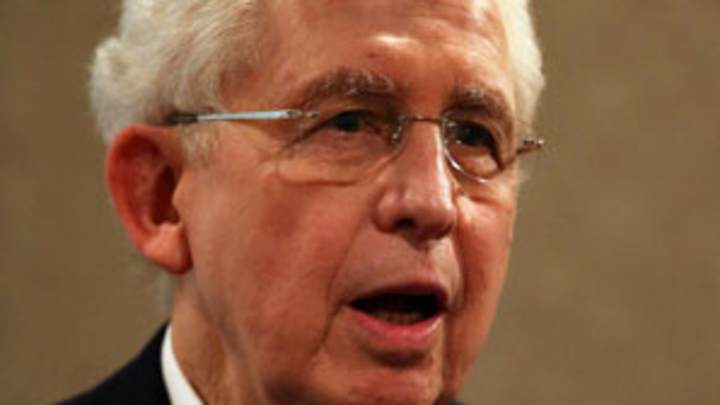Notre Dame's Swarbrick, SEC's Slive formed unlikely BCS alliance


SI.com's BCS Championship Game Preview Hub
FORT LAUDERDALE -- The fans of Notre Dame and Alabama are descending upon South Florida for what projects to be a once-in-a-generation national title game. These programs inspire enough passion to deliver blockbuster television ratings, and they boast enough history to fill a graduate-level course load.
Any good narrative is driven by tension, and that's not lacking here, either. Irish fans have printed "Catholics vs. Cousins" shirts to poke fun at their Southern brethren, while Alabama supporters have spent weeks arguing about how many games Notre Dame would lose in the SEC. Respect for this Irish squad has come grudgingly south of the Mason-Dixon line.
Yet that same snarky tension will not extend to the executive suites at Sun Life Stadium. Few fans of Notre Dame and Alabama realize that the most powerful sporting executives representing each school spent the last year working in lock step to produce version 2.0 of the BCS. Notre Dame athletic director Jack Swarbrick and SEC commissioner Mike Slive bonded over long breakfasts, frequent phone calls and occasional late nights cocktails while helping hash out college football's new playoff.
"Most significantly," Swarbrick joked of their bond, "we both drink bourbon."
The two knew each other only in passing before the push to create the BCS playoff began in earnest in January 2012. And in a season that will end with both schools' respective fans taunting each other, a mutual respect was forged between two of the key players in the BCS process.
Swarbrick described Slive's role as a keen listener, a distiller of facts and an astute analyst of BCS political nuance. Slive plays the E.F. Hutton role -- when he talks, people listen. "He's the opposite of dominating the room," Swarbrick said.
Slive described Swarbrick's role as that of "Switzerland," someone who facilitated the discussion, created talking points and designed multiple presentations for the group. Swarbrick was the only AD at the BCS meetings -- thanks to Notre Dame's unique role in the BCS system -- and he used his lack of multiple constituencies to push the process forward.
"In my mind, he played a critical role in the success that we accomplished during the year," Slive said of Swarbrick. Added BCS executive director Bill Hancock: "Jack was our MVP."
Part of the Slive-Swarbrick alliance stemmed from a common vision for the coming playoff. And while fans may view Notre Dame and the SEC as philosophical opposites, the two entities bonded during the restructuring process. Among other things, they shared a mutual desire to block a conference-championship requirement for the four-team playoff.
Slive was coming off a year in which his league placed two teams in the title game. Swarbrick's team is an independent, which prompted obvious motivations to prevent a conference-champion requirement. While Notre Dame and the SEC didn't agree during every step along the way, the relationship between Slive and Swarbrick grew as the monotonous meetings progressed. Their relationship offers a window into the behind-the-scenes workings of big-time college athletics: As the conference commissioners have evolved into "stewards of the game," according to Slive, the decisions on the future of the sport are formed by a select few.
Looking back, the relationship between Slive and Swarbrick really began with a breakfast at one of the early series of meetings in Indianapolis. After a morning meal at a hotel ran to nearly 11 a.m., Slive said the conversation flowed so fluidly that they didn't even realize how much time had lapsed.
As the BCS meetings continued throughout the year, Slive and Swarbrick emerged as sounding boards for each other. Swarbrick recalled one night where Slive smoked a cigar on his hotel balcony as they sipped their preferred bourbon, Blanton's, and hashed out the issues.
"I came to have enormous respect for his intellectual firepower and strategy and ability to think big picture," Swarbrick said. "Mike can sift through a lot of information and facts very quickly and synthesize it."
Added Slive about Swarbrick: "He's got a very nice way about him and is very articulate. Jack was very good at trying to identify the issues and zeroing in on them and putting options together."
As the SEC has marched to six straight national championships, Slive has risen to a perch as one of the most powerful figures in college sports. He shares that lofty air with his rival and foil, Big Ten commissioner Jim Delany. One BCS insider identified Swarbrick -- who has known Delany well for years -- as an occasional broker between the two. Delany's role in coming to an endgame with the BCS should not be understated. But Delany and Slive have different ways of getting their message across, and that comes through in the boardroom. While Delany tends to dominate conversations in the meetings, Slive is the opposite. "Mike picks and chooses when he speaks," said Karl Benson, the Sun Belt commissioner. "He doesn't dominate the conversation. He's very judicious with his words."
On Monday night, the BCS title game will play out, and either Notre Dame's fight song or the familiar "S-E-C, S-E-C" chant of will resonate throughout the stadium. But regardless of the stakes, don't be surprised to see Slive and Swarbrick bellied up somewhere around South Florida, toasting their successful years on and off the field.
"I called Jack yesterday and congratulated him on his season," Slive said in a phone interview last week. "And I suggested that if we worked hard enough, we may be able to find a glass of Blanton's in Miami."
